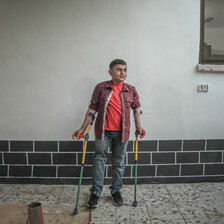The Electronic Intifada Gaza Strip 27 August 2014

A family member mourns during the funeral of five members of the Jouda family in Jabaliya, northern Gaza, on 24 August.
APA imagesAn elder cousin daubed the blood that dripped from a wound near Thaer Jouda’s left eye Tuesday afternoon as the nine-year-old lay in a bed in Gaza City’s al-Shifa hospital.
“He’s very good in English,” the cousin said. But Thaer, his face and body lacerated by shrapnel from an Israeli airstrike on Sunday and his right leg amputated at the knee, had little interest in talking.
The bombing, which injured Thaer and his eleven-year-old sister Rahaf, also killed his mother Rawiya (43 years old), his sisters Tasnim (14) and Raghida (13) and his brothers Muhammad (8) and Usama (6).
The five deaths made the Joudas, residents of Tal al-Zaatar in the northern Gaza Strip’s Jabaliya area, one of the hardest-hit of the 91 families counted by the Palestinian Ministry of Health who lost multiple members during single attacks during Israel’s 51-day military offensive.
An earlier list from the United Nations Office for the Coordination of Humanitarian Affairs, including some casualties not yet confirmed by the Ministry of Health, counted 140 families that had lost three or more family members in a single incident by 20 August.
Many families were killed by Israeli strikes on almost 190 mosques, more than 140 schools and other civilian institutions, some used as shelters for Palestinians displaced from their homes by Israeli military operations near the barrier that separates Gaza from present-day Israel.
The Al Mezan Center for Human Rights has recorded at least 990 people killed inside their homes in Israeli attacks, including 324 children. That’s almost half of all people killed in the Israeli assault. Israeli strikes affected at least 10,589 homes, 2,715 of which were completely destroyed, by 25 August.
“My ears broke”
In the hallway outside Thaer’s room, his father, Issam, recalled the airstrike that ended the lives of his wife and four children two days earlier.
“At 4:00 pm, I was inside the house,” he said. “All the rest of my family was sitting in the front hall. Their mother was standing in the middle of the boys. They were playing as they were accustomed. ”
“As Rahaf was coming inside, I heard a massive explosion. My ears broke. I saw a huge mass of dust in the area and shrapnel scattered all over the hall.”
“After the blast, my daughter Rahaf grabbed my neck. She was screaming ‘Father! Where is my mother? Where are my brothers?’”
“Shrapnel everywhere”
After checking his surviving daughter for injuries, Issam said, he told her to leave the house quickly. Looking at the rest of his family in the hall, he said, “They lay with shrapnel everywhere and a pool of blood around them. It’s like they were swimming in it. There were six of them, five killed.
“I heard the voice of my son saying, ‘Dad.’ The others were scattered everywhere. You couldn’t distinguish between them because of the heavy shrapnel wounds in their faces.
“The voice was Thaer. I carried him and left the house quickly. I felt my body cut from the shrapnel as I carried him. Then our neighbors took him and the rest of our family to al-Awda hospital.”
At the hospital, Issam said, Thaer was alert, asking him for water. “In another bed, I saw my little boy, Usama. He was smiling in his sleep. I tried to hug and kiss him. There was no response.
“I tried to convince myself that he had returned my smile. And I refused to listen to anybody saying that he was dead.”
On Saturday, Issam said in passing, he had bought his youngest son a track suit for the winter.
In another bed, he recalled, “I saw my wife covered by a sheet. I removed it quickly, and saw that she was also dead.”
His other three children had been transferred to a separate hospital, Kamal Edwan. By the time he arrived to identify them, he said, staff had moved them into the refrigeration units used to store the dead before burial. “You could not recognize the features of their faces and heads.”
“Incremental genocide”
In an interview with Rania Khalek, published by The Electronic Intifada shortly after a ceasefire between Israel and Palestinian resistance groups was declared yesterday, Center for Constitutional Rights former executive director Michael Ratner called Israel’s ethnic cleansing and massacres of Palestinians “incremental genocide.”
Sitting outside his only surviving son’s hospital room, Issam said, “The international community must punish the Israeli war criminals and end the occupation as soon as possible.”
“Global society, which talks about justice and international law, must take responsibility to protect the Palestinian people from this massive destruction. These are war crimes.”
Editor’s note: the caption originally misidentified the man in the photo as Issam Jouda. It has since been corrected.
Joe Catron is a US activist in Gaza, Palestine. He co-edited The Prisoners’ Diaries: Palestinian Voices from the Israeli Gulag, an anthology of accounts by detainees freed in the 2011 prisoner exchange. Follow him on Twitter: @jncatron.





